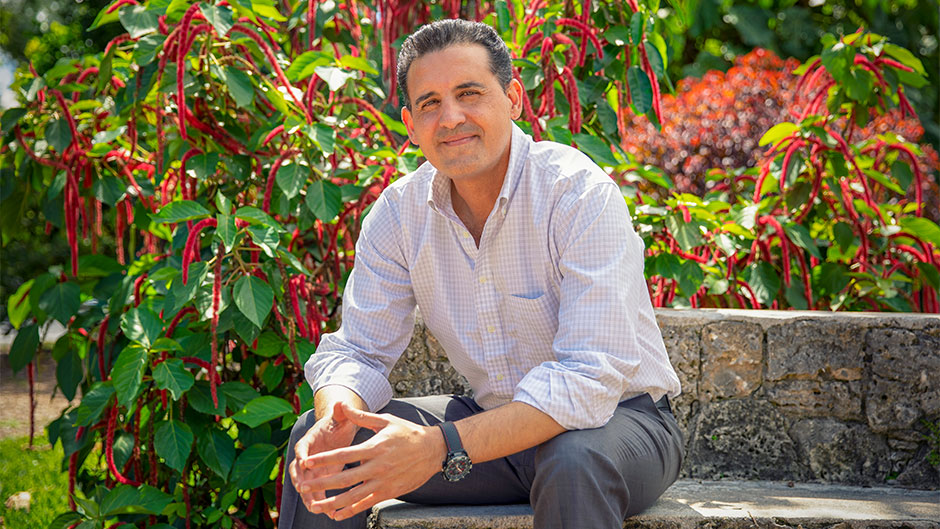Growing up, Endara loved to draw and had a knack for math so architecture seemed like the most logical career path given his interests and strengths. Born in Ecuador the oldest of three boys, he spent his youth in Los Angeles, California and moved to Miami, Florida at 14. Endara joined the ’Canes community as a college student, earning a Bachelor of Architecture in 1996, and came on as a full time employee after graduating. When he’s not at work—reviewing plans, coordinating with consultants and clients, inspecting job sites, and preparing budgets—you can find him advocating for animal rights and educating others on veganism or elbow deep in a game of poker.
How did you learn about veganism, when did you become a vegan, and why is it important to you?
Three years ago I decided to go vegan after witnessing my youngest brother make the change in his own life about two years prior. At the time, I never thought I’d be able to adopt the vegan lifestyle, let alone become an animal rights activist, but here I am. The seed my brother planted in my mind made me curious enough to do my own research. I eventually learned that I could live in a way that seeks to cause less suffering in the world while simultaneously helping to reduce my environmental footprint and improve my overall health. It seemed like a win-win-win all around.
Tell us about your work as an activist.
I think I always envisioned being a teacher. As an adult, I thought this ship had sailed, until I became a vegan and started doing lectures and presentations sharing with students and others around the community the many benefits of veganism. After hearing me speak, my hope is that I inspire enough curiosity in my listeners that they will go home and begin looking into veganism on their own. I also participate in street activism as a member and co-organizer of the Miami chapter of Anonymous for the Voiceless, an animal rights activist group that started in Australia in 2016 and has launched over 900 chapters across the globe.
What’s an example of something small that anyone can do but will make an impact?
Replacing dairy milk with non-dairy milk products. There are dozens of dairy-free milk beverages out there that taste as good or better than cow’s milk, including milk made from soy, almond, oat, rice, coconut, hemp, and cashew.
What steps do you recommend to someone thinking of becoming a vegan or being more mindful of their habits and lifestyle?
There are many resources to help people transition into veganism depending on their interests. The site challenge22.com is designed for people who want to try a vegan lifestyle. As a member you are assigned a personal mentor and have access to clinical dietitians who can answer any questions. If someone is gravitating towards the health aspects of veganism I may point them to watch the documentary Forks Over Knives and visit nutritionfacts.org. If they are more keen on environmental issues, I would recommend they watch the documentary film, Cowspiracy. If they’ve shown interest in learning more about the animal’s experience, I suggest they check out the documentaries Earthlings and Dominion.
Tell us about how and when you started playing poker.
I started playing poker sometime around 2007 when a few friends began hosting weekly games at home. Before long, I was buying strategy books and watching game theory videos. The more I learned about poker strategy, the more I became interested in the game. As a competitive player, I quickly learned that, although luck plays a big factor, skill ultimately wins in the long run. After a few years playing with friends at home, I decided it was time to take it to the next level and try my “luck” in local tournaments and casino cash games.
Why do you enjoy playing and what do you get out of the game?
I enjoy playing because it is extremely challenging. There are many layers and levels that require critical and logical thinking. As a player, I am constantly working to problem solve at every decision point. There is always room to learn and improve, and this is what I love about the game. One of my favorite quotes about poker is that “poker is not a game of cards played with people, but rather a game of people played with cards.”
Have you competed, and if so, what’s been the most interesting game or competitor you’ve gone up against?
I have been competing at the highest level in major tournaments around the country for the past seven years. Over the last four years I have played in the World Series of Poker (WSOP) tournaments in Las Vegas and with some of the world’s best poker players, including Gus Hansen, Patrik Antonius, Kathy Liebert, and Greg Raymer aka Fossilman, to name a few. The most interesting game I’ve played has to be the main event of the WSOP, which is the most prestigious tournament in the world drawing competitors from all corners of the world.
In terms of ameteur and pro status, where do you stand in the mix?
I consider myself an amateur player because I don’t play full time, and it’s not my main source of income. However, I do believe I play with the mindset of a pro. In tournament poker, I make it “in the money” about 14 percent of the time, meaning I have placed in the top 10 percent and have won a portion of the prize pool. When I do make the money, my average finish is top four percent. I am currently ranked in the top 10 percent in Florida, USA All Time Money List.
Editor’s note: Know anyone with an interesting hobby or passion project? Share your story ideas with us at LifeatTheU@miami.edu.

